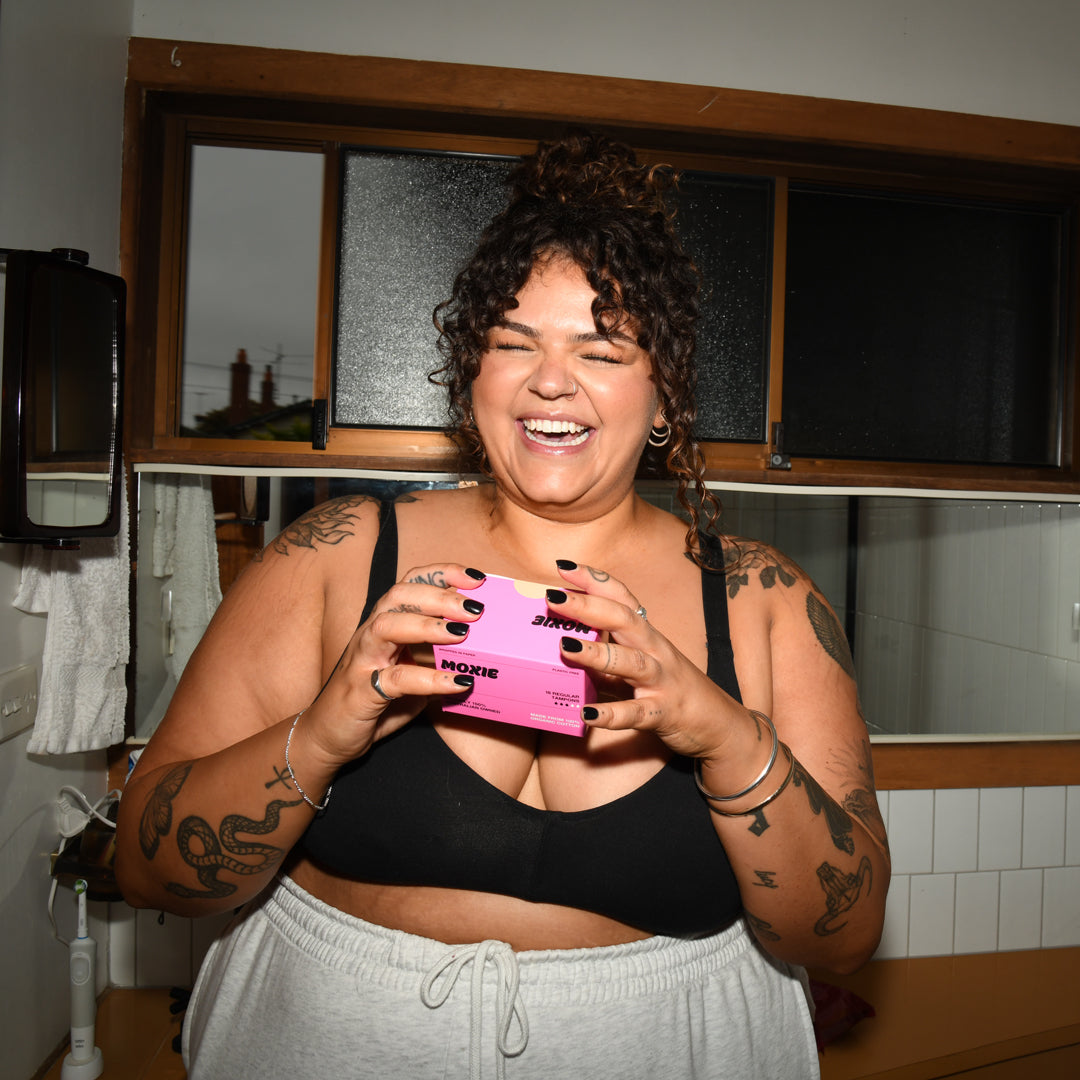How to identify anxiety (and what it can do to your period).

Photo by Maria Oswalt on Unsplash.
Words by Casey Vassallo.
Anxiety feels like many things to different people. It can be like a constant spring in your step, or a crippling fear that shadows you like a foe. Wherever you fall on the scale, there are steps you can take – you’re not alone.
When it comes to anxiety, Georgie Collinson has all the credentials. She’s an anxiety mindset coach, naturopath and nutritionist based in Melbourne. She’s here to answer Moxie’s questions about identifying anxiety, what steps you can take to deal with it better, and how your period is a strong measure of the impact stress has on your body.
How can someone identify having anxiety?
The key sign of anxiety is a sense of ongoing worry that interferes with your ability to focus, rest and relax. You might feel like your brain is continually pinging with fear-based or critical thoughts that you are not safe. Anxiety often leads to better productivity and motivation but also can be a paralysis of overwhelm from the great pressure you put on yourself.
A typical presentation of anxiety is waking early in the morning with your heart pounding, thinking there's some rush to get up and get going. There is usually a sense of dread for the day ahead. Some people experience more anxiety in the evenings, usually due to overwork or over-stimulation too late at night. For others, there’s an underlying sense of adrenaline in their system, like something is not okay, which lasts throughout the day.
What’s the difference between feeling anxious and having anxiety disorder?
I work with high-functioning anxiety. This is where someone might look like a productive, high-achiever who is very organised and has it all together. But often deeper fears drive their need to overwork and be perfect, making it hard to switch off and relax. They often feel exhausted and may have experienced a panic attack, but manages to get on with things.
On the other hand, someone with generalised anxiety disorder (GAD) might experience frequent panic attacks, an inability to relax, restlessness, persistent feelings of worry, sleep interference and disruption to the normal function of their life. For example, you find yourself not able to engage in the same activities you normally would, feeling paralysed for long periods of time, and unable to complete your work or finish a task. There is usually no clear reason for the worry. These symptoms need to occur for at least six months to qualify for GAD, so it's more than just going through a stressful phase in your life.
What are the facts around anxiety disorder for women?
Beyond Blue states that 1 in 3 women in Australia will experience anxiety in their lifetime. However, this is referring to generalised anxiety disorder. When I consider the women with high-functioning anxiety I work with, and their reluctance to seek support due to their highly independent nature, I suspect the true figure is much higher.
What are some of the steps to take if you think you might have anxiety?
The kind of support you seek depends on how severe your symptoms are. For example, if you struggle to function in your day-to-day life, can’t turn up to work or focus, have unresolved trauma, experience regular panic attacks, or have obsessive or suicidal thoughts, it is best to go to your doctor and ask for a mental health plan with a psychologist.
For someone who is managing to keep working and living life but feels exhausted by their lifestyle pace, possibly notices they are using food or alcohol as a coping mechanism; wants to build self-love, confidence and self-acceptance, and wants to improve their resilience to day-to-day stress and anxiety, then my resources are an ideal place to start: The Anxiety Reset Podcast, or my online programme Reset Your Anxious Mind In 90 Days. I know these types of women, and they need personal support and accountability.
What if you know you have anxiety but aren’t feeling in control of it?
Seek support. I think the first step is understanding that you do not have to keep going on your own, even though this is how you've survived for so long. The best way to get a shift happening in your mindset and physical health is to work with someone who can support you in that process, and throughout the inevitable road bumps.
As I teach my Reset Your Anxious Mind In 90 Days (waitlist here) programme members in detail, the next step is learning to accept the anxiety as a sensation in the body that is welcome, and get curious about why it might be there, instead of our instinct to push it away.
The programme provides access to weekly video trainings, a support community and live weekly one-hour sessions. Each week we focus on one aspect of your mindset and physical health, to make consistent, lasting and achievable changes.
What are some of the anxiety-related issues you’re seeing come out of COVID-19?
The biggest one is the sense of uncertainty. We like to be able to predict or plan the future to feel safe. Throughout this year, there has been a great level of unpredictability; we cannot plan for what is to come in two months or know how the restrictions will alter.
Being cut off from a sense of community inevitably leads to poor mental health, as does restricted exercise. We have seen increases in domestic violence and other unfortunate situations, not to mention the health anxiety that has arisen too. It has been a challenging time for many Australians, particularly in Victoria.
How can anxiety influence a menstruating person’s period?
It can be a little like the chicken or the egg. Anxiety leads to a greater release of stress hormones in the body, which throws out the balance of our reproductive hormones (particularly lower levels of progesterone). This stress hormone influx is thought to be a key factor in the severity of premenstrual syndrome (PMS). The premenstrual symptoms themselves most commonly include a greater sense of anxiety, so it goes both ways. One of the things I love helping women with is supporting these hormonal fluctuations so that anxiety doesn't have to increase every month before their periods.
High levels of stress and anxiety can also lead to irregular periods and period loss due to the influence on stress hormones interrupting ovulation. Period symptoms always suggest there is something out of balance in the body that can be supported. By addressing the stress and anxiety in your life, you might experience less period pain, reduced PMS, more regular periods and less spotting.
What do you wish more women knew about anxiety?
Your period is your most powerful asset for gauging your health and how hard you are pushing your body with stress and anxiety. If you have a poor relationship with getting your period, I encourage you to look closer and connect with it. Start tracking your cycles in an app. Note the fluctuations in your mood throughout your cycle. Learn more about your hormones through trusted, evidence-based resources (Taking Charge Of Your Fertility by Toni Weschler is a great book) and what else you could do to support your health and mental wellbeing. There is so much we can do with nutrition, stress and anxiety management, and herbal medicine. I’d suggest working with a natural medicine practitioner for in-depth support to create an individualised plan for you.

About the writer
Casey Vassallo is a writer, among other things. Not wanting to be pigeonholed, she works across several genres in the media world, covering everything from restaurant openings, to how women spend their money, and the facts about intimate hygiene for Moxie.
(And in case you’re wondering, she also has a BA, double majoring in professional writing and creative writing - Girl's Got Moxie!!).



